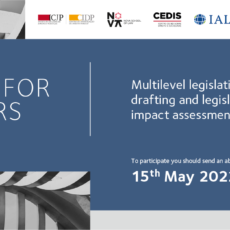Project Abstract
The legislative power is a tool to accomplish national and supranational public policies in a Rule of Law. For that matter, the exercise of the legislative power and legislative function must be enforced by the citizens, who are addressees of the laws that are issued and of the public policies that justify them.
The accountability of the exercise of the legislative power justified the creation of the Portuguese Legislation Observatory in 2005, to help evaluating the quality of the legislation. This evaluation is done through a quantitative assessment of the Portuguese legislative production (its number, its extension, its division into different types of law and legislative initiate, its issuing state bodies and its subjects). This is yet a pioneer projet in Portugal.
Now the aim is to go beyond this global characterization and to register more precise indicators on the law-making methodology through: (i) the rate of changes introduced in the legislation and the reasons behind those changes; (ii) the rate of legislation rectifications; (iii) the compliance of the regulatory duty and in which deadlines; (iv) the law consultation and participation procedures; (v) evaluation procedures.
To register these indicators, a Portuguese legislation database has been set up and it will enable an assessment of every law itself and its relation with other laws. This database should be opened to the general public on a free basis and provide a broad insight on the Portuguese legislation. This database is different from any other existing database. It will be possible to compare the evolution of the upper mentioned indicators, the number of published laws and impact of European Union’s law in national law.
Furthermore, the aim is to create a mechanism to evaluate the accomplishment of public politic goals by assessing the net aggregate costs of the framed national legislation. This analysis aims to identify the situation before introducing a certain legislative measure and its eventual creation of red tape costs and friction costs. This allows to verify if the legislative instrument used to execute a public policy has accomplished its goals or if, on the contrary, it has created obstacles to its accomplishment. In the end, the aim is to identify the net aggregate costs of the legislative instrument taking into account its goals.
Institutions
NOVA School of Law
Institute for Legal and Political Sciences of the Lisbon University Faculty of Law
Project Members
Francisco Maria Gil Fernandes Pereira Coutinho (Leading Researcher)
João Tiago Valente Almeida da Silveira (Co-Leading Researcher)
Manuel Francisco Magalhães Cabugueira
Pedro Brito Veiga Moniz Lopes
Sónia Cristina Carvalho Rodrigues
Raquel Helena Veiga Saraiva Franco Moniz
Rui Tavares Lanceiro
Eduardo Magrani
Cristina Oliveira
Martim Farinha
Felipe Moraes de Andrade
Sofia Solayman
Cecília Barros





